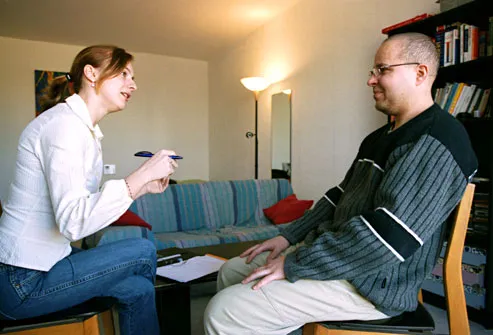The Truth About Talk Therapy

Myth: It's All About Your Mother
If therapy makes you think of lying on a couch talking about your childhood, you may be in for a surprise. Real-world therapy has very little in common with fictional scenes on TV. Although discussing the past may be helpful in some situations, most current therapies focus on solving problems in the present and future.
Swipe to advance

2
/
15
Fact: It's All About Tools
Therapy provides tools for solving problems and enhancing quality of life, says psychologist Parinda Khatri, PhD. These tools may include relationship skills, anger management, or techniques for controlling thoughts and actions. "You don't have to go into past issues," Khatri tells WebMD. "You can be very focused on the present and specific problems you are targeting."
Swipe to advance

3
/
15
Myth: Therapy Is for Crazy People
Therapy may have its roots in treating severe mental disorders, but it has since gone mainstream. You don't have to have a mental illness to benefit from therapy -- and seeking therapy does not mean you are mentally ill. Nor is it a sign of weakness. In contrast, it's a sign of resourcefulness. When life feels like it's spinning out of control, therapy is one tool to help you control the spin.
Swipe to advance

4
/
15
Fact: Therapy Is for Everyday Life
These days, everyday life means juggling the demands of your job, family, health, and social circle. Therapy can help you manage those demands more gracefully, whether you're an overstressed parent or a short-tempered executive (or both). Getting a handle on everyday demands will help you function at a higher level and experience more joy.
Swipe to advance

5
/
15
Myth: You'll Be in Therapy Forever
That idea of being in therapy for years? It's another TV cliché. Yes, some people may benefit from ongoing therapy, especially if they have a long-lasting mental illness. But many mental health and quality-of-life issues can be addressed in a few weeks or months.
Swipe to advance

6
/
15
Fact: Short-Term Therapy Works
As few as one to four sessions can help you make significant changes in your life, Khatri says. And the benefits go beyond relieving stress and anxiety. Short-term therapy can help you improve your relationships, brush up on parenting skills, sleep better, manage your weight, adopt healthy habits, and become more effective in pursuing your goals.
Swipe to advance

7
/
15
Myth: Therapists Just Listen
It has become a running joke: Therapists just listen and say things like, "How does that make you feel?" Although listening is a critical part of the job, good therapists also do a lot of talking. This includes asking targeted questions, helping you set goals, and teaching skills that will help you meet those goals. Your therapist may even assign homework to help you practice your new skills.
Swipe to advance

8
/
15
Myth: All Therapy Is the Same
All kinds of therapy are, in essence, a conversation. But the content and structure of that conversation depend on the type of therapy. Solution-focused therapy helps identify and implement strategies that have worked for you in the past. Interpersonal therapy helps improve your interactions with the people in your life. Psychodynamic psychotherapy, a variant of traditional psychoanalysis, aims to give people greater insight into their psychological conflicts and unconscious motivations and feelings. Other options include cognitive-behavioral therapy (CBT) and acceptance and commitment therapy (ACT).
Swipe to advance

9
/
15
Facts About CBT
Cognitive behavioral therapy is one of the most studied forms of psychotherapy. This approach teaches you to recognize and change self-defeating thoughts and behaviors. It is especially effective at treating depression, anxiety, and substance abuse, but can also be helpful for everyday issues, like sleeping better and adopting healthy habits. A typical course of CBT lasts six to 20 sessions.
Swipe to advance

10
/
15
Acceptance and Commitment Therapy
Acceptance and commitment therapy (ACT) is a form of CBT that helps you become more flexible in meeting challenges. This approach emphasizes acceptance of uncomfortable experiences, along with a commitment to actions that support your personal values. It is particularly helpful in coping with workplace stress, chronic pain, and other long-lasting medical conditions.
Swipe to advance

11
/
15
Facts About Couples Therapy
Think couples therapy is for partners who are on the verge of divorce? Therapy is actually far more effective when a relationship is mostly positive, and partners can learn to work through their differences respectfully. "Do you want to dig yourself out of a very big hole," Khatri asks, "or learn to build a bridge over a smaller hole?" Waiting too long is one of the top mistakes couples make with regard to therapy.
Swipe to advance

12
/
15
Myth: All Therapists Are the Same
The term "therapist" includes people with a wide range of credentials. Psychiatrists are medical doctors who are trained both to provide psychotherapy and prescribe medications when appropriate. Clinical psychologists have a PhD or PsyD (doctor of psychology) and are highly trained psychotherapists. They are not medically trained and therefore cannot prescribe psychiatric medicines except in a few states where legislation has granted them prescribing privileges. Psychiatric APRNs (Advanced Practice Registered Nurses) are clinical nurse specialists or nurse practitioners with at least a Master's level degree who have advanced mental health training and can provide psychotherapy as well as prescribe medications (either independently or under supervision of a psychiatrist, depending on the state). Social workers and licensed mental health counselors are also qualified to provide therapy. Choose a mental health professional who is experienced in the type of therapy you prefer.
Swipe to advance

13
/
15
Fact: Therapists Are Not Pill Pushers
Prescription medicine is only one tool a therapist may suggest. The use of medicine depends on why you're seeking therapy and the severity of the problem. For mild to moderate depression, therapy is often enough. For more severe depression or anxiety, or certain other types of mental health problems, a combination of medication and therapy often works best. Ask your doctor about the pros and cons of medication in your case.
Swipe to advance

14
/
15
Myth: Therapy Is Expensive
Therapy is sometimes viewed as a luxury, but the costs are more reasonable than you might think. Insurance often covers mental health services, and many university clinics have sliding scales or payment plans. Remember that a handful of sessions can provide significant benefits. If you only see a therapist for a short period, the cost will be more manageable.
Swipe to advance

15
/
15
Fact: Therapy Can Be Convenient
If you've been avoiding therapy because you think you don't have the time, think again. Many offices have weekend and evening hours, and some therapists are willing to do sessions by phone or Skype (as long as you are not in serious distress). Instead of the traditional hour long appointment, therapists can be flexible to accommodate even the busiest schedules. This works best for targeted issues, such as how to sleep better or manage your anger.
Swipe to advance
- Get link
- X
- Other Apps